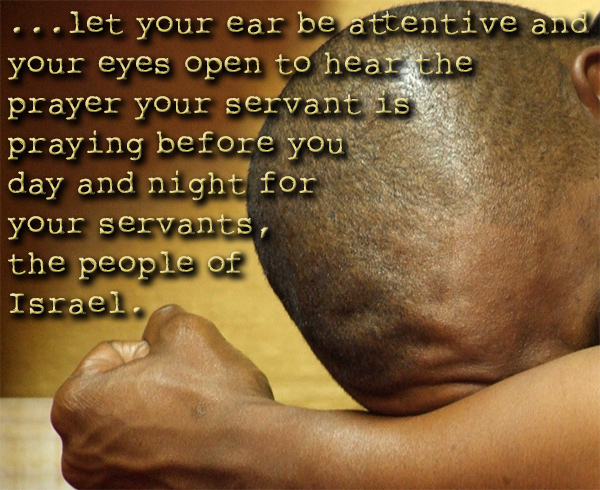"I'm not sure I can pray anymore. It's useless. They're not heard. They go unanswered. I don't know what to say. I'm frustrated, discouraged, and disappointed in my faith and with God. I don't even know what to say anymore."
"My prayers are like impotent BBs. I launch them to heaven. They hit the ceiling. They ricochet around the room. They fall to the floor. Then they sit there underfoot waiting to trip me up and mock me as they go unanswered, and my heart goes un-mended."
"What can you say to me to help me know my prayers matter and that I'm not ignored by heaven?"
Prayer can be a great blessing. Prayer can also be a great struggle. Yet we can find hope in the dark night of our wounded soul. We can make connection with God in the middle of our life's messes. We can regain our trust even with the brokenness of our spirit and our disappointment with God. Though not easy, the road we travel back to the Father has been walked before. They show us he is waiting and watching and yearning for us to come to him.
Here are three assurances for us to hang onto during tough times in our prayer life. I'm sure there are others. For today, however, let's hold onto these three.
First, there is the little story that Jesus told about a persistent widow who kept "bothering" an unrighteous judge when she was trying to receive justice (Luke 18:1-8). Jesus told this story to remind his followers "that they ought to pray and not lose heart" (Luke 18:1 ESV). His point is that if this lady got her way with an unrighteous judge, then surely God will bring justice for his "chosen ones, who cry out to him day and night" and he won't "keep putting them off" (Luke 18:7 NIV).
Second, the apostle Paul tucks away an incredible promise in the middle of his famous chapter on the Holy Spirit (Romans 8:1-39):
In the same way, the Spirit helps us in our weakness. We do not know what we ought to pray for, but the Spirit himself intercedes for us through wordless groans. And he who searches our hearts knows the mind of the Spirit, because the Spirit intercedes for God's people in accordance with the will of God (Romans 8:26-27).The Holy Spirit intercedes for us with the Father. Because of this intercession, God always hears our prayers, even if we cannot verbalize what is on our hearts. Even our feelings are heard and made clear to the Father. Everything we need to say and want to say and all that we feel is cleaned up by the Spirit and brought to the Father in an appropriate and clear way.
 Third, there is Nehemiah (Nehemiah 1:1-11; Nehemiah 2:1-5). His country and the prized city of Jerusalem lay in ruins. The city was mound after mound of rubble and destruction. The Temple had been rebuilt, but for a hundred years the city lay in ruin. Few lived there. Those who did were unprotected. The worship of God and the services of the Temple had ceased. So Nehemiah prayed and fasted about the problem for four months. He prayed night and day. He shed endless tears and was lost in deep grief. He confessed his own sin and also owned the sin of his people - sin that went back generations. He longed for God to take action to redeem the mess and rebuild the city. Then God did take action: he called Nehemiah to rebuild the wall and got the King of a foreign land, Persia, to help him.
Third, there is Nehemiah (Nehemiah 1:1-11; Nehemiah 2:1-5). His country and the prized city of Jerusalem lay in ruins. The city was mound after mound of rubble and destruction. The Temple had been rebuilt, but for a hundred years the city lay in ruin. Few lived there. Those who did were unprotected. The worship of God and the services of the Temple had ceased. So Nehemiah prayed and fasted about the problem for four months. He prayed night and day. He shed endless tears and was lost in deep grief. He confessed his own sin and also owned the sin of his people - sin that went back generations. He longed for God to take action to redeem the mess and rebuild the city. Then God did take action: he called Nehemiah to rebuild the wall and got the King of a foreign land, Persia, to help him.
This last example has some powerful things to teach us about our deepest yearnings in prayer. Nehemiah shows us a way out of our own frustration with prayer. So take a moment and dig around in Nehemiah's prayer as he asks God to give him success with the king each day (Nehemiah 1:5-11).
Notice that he prayed this prayer for months.* He prayed and fasted and wept off and on for four, long, wearisome months before King Artaxerxes noticed. But he kept praying. God kept working on the King's heart. Even when Nehemiah's prayers were heard, there was still much work for him to do - hard work, wearisome and discouraging work. But Nehemiah's faithfulness to prayer and willingness to be part of God's solution brought a great blessing to God's people and Nehemiah.
Nehemiah began his prayers with a recognition of the greatness and faithfulness of God (Nehemiah 1:5). He ended his prayers with a reminder of God's promises to his people (Nehemiah 1:8-10). In this way, Nehemiah reminded himself of God's position, power, and people - that God works through a people and not just a person and that he, Nehemiah, was a part of that people.
In his prayers, Nehemiah owned his own sin by confessing it (Nehemiah 1:6-7). He also owned the sin of his predecessors who had been unfaithful. He made clear that he wanted to be the terminal generation for this unfaithfulness. He didn't blame others; he included himself in the blame.
- He asked for God's help in important conversations (Nehemiah 1:11; Nehemiah 2:4).
- He asked for God to bring defeat to the mocking enemies of God's people (Nehemiah 4:4; Nehemiah 6:14).
- He asked for his own good deeds to be remembered favorably by God (Nehemiah 5:19; Nehemiah 13:14; Nehemiah 13:31).
- He asked God to remember the evil others had done to hurt God's people and dishonor God's holiness (Nehemiah 13:29).
- He prayed for God to make him strong for the hard tasks he faced (Nehemiah 6:9).
From Nehemiah, we learn to be faithful in prayer even when it doesn't seem to be getting us anywhere. We learn to be honest with God in prayer about our sin and the sin of those who are around us and those who have come before us. We learn to praise God for his power and faithfulness as well as remind ourselves of God's promises for us. From Nehemiah, we also learn that we can tweet God simple, conversational, and honest prayers about the challenges and opportunities we face in our lives.

Satan would like to make us think our situation and our broken heart don't matter to God. The evil one wants us to believe our prayers go unheard - that they are either unworthy to be heard or that God is ignoring our condition and ignoring us. The devil wants us to feel alone and rejected. Yet if we will remind ourselves of these three prayer stories - the persistent widow, the promises of Paul about the Spirit's help, and the example of Nehemiah - we have a prayer toolset. This tool set offers us encouragement to pray and not lose heart. This toolset offers us promises that our prayers are always heard. This toolset offers us examples on how to pray and what to pray. This toolset offers us assurance that even when we can't find the words to pray, we can point our heart to heaven and know the Holy Spirit makes sure we are heard as a precious child of God.
So in our brokenness, discouragement, disappointment, and doubt, let's "pray and not lose heart"!
* Nehemiah began his prayer in "the month of Kislev in the twentieth year..." (Nehemiah 1:1). His prayer, fasting, and grief continued every day for four months until the king noticed and acted on his behalf in "the month of Nisan in the twentieth year of King Artaxerxes" (Nehemiah 2:1).

Next Week from Nehemiah: "They Put Their Hands to the Work"












Comments
Have thoughts on this article? Leave a comment